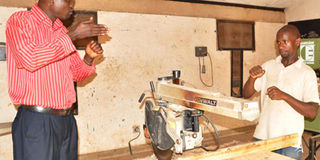Prime
Julius Omugur: Interpreter for the deaf, academician and an advocate

Mr Omugur (L) lectures a deaf student at a carpentry school for the deaf in Kampala.
PHOTOs BY RACHEL MABALA
What you need to know:
Big heart. Having grown up in a community of the deaf, Mr Omugur took a career path to help them. He now lectures those unable to hear, interpret for them on television and is pursuing a PhD in the same field.
If you are an eagle-eyed viewer, you might have noticed Mr Julius Patrick Omugur gesturing at the bottom right of your screen during the Uganda Broadcasting Corporation (UBC) TV newscast at 10pm.
A section of viewers have become fascinated by Omugur’s ability to quickly convey the anchor’s words into sign language.
However, his job gives Ugandans a brief glimpse of a job that is largely invisible in our society.
But with the recent passing of the law for all television stations to employ sign language interpreters at newscasts, the career is now becoming vital.
Equipping the deaf
The 39-year-old Omugur was among the pioneer special needs trainees at a pilot course in Kyambogo University, previously run by the National Association for the Deaf.
At the time, Mr Omugur says special needs training was done on a two-weeks rotation between the Ngora School for the Deaf, Kyambogo University and Mumias School for the Deaf in Kenya.
Some students from Ngora later moved to Mumias School in Kenya‘s Western Province, and joined Kyambogo University for Higher Education in Special Needs.
The pioneers were trained for three years in sign language interpretation, though the course now takes two years for both theory and practical.
Kyambogo University has 10 practicing interpreters who translate for students with a hearing impairment. But Mr Omugur says those who qualify sometimes do not get job placements.
“It’s quite difficult for interpreters to get jobs with government because as we talk now, there is no policy that guarantees their employment. They cannot be employed in ministries, hospital or court because there is no policy in place,” he said.
“The interpretation of the Constitution which was passed last year mandated all media houses to employ interpreters, so we are still waiting to see that Bill operationalised.”
Under a Uganda Communications Commission regulation, all TV broadcasters have up to February 28 to have sign language interpreters.
But some broadcasters have argued that there is scarcity of Luganda and Swahili interpreters.
A visit to UBC, found out that interpreters are sourced from the National Association for the Deaf and given part time contracts.
The Head of the Special Needs Faculty at Kyambogo University, Mr Victor Lacoro, argued that sign language interpreters often fight against stigma, and at times rejection in their work places.
Signing profession
He recommended that sign language interpreters, and those with hearing impairment, develop a good working relationship, and encourage people to take on sign language as a profession.
In 2007, Omugur graduated with a master’s degree from Oslo University, Norway, where he published a research paper on challenges sign language interpreters face in working with children with hearing impairment in educational settings.
Omugur joined Kyambogo in 2003, and has worked as a sign language interpreter at UBC TV since 2005.
He also took assignments for the Uganda Deaf Development Programme for four years.
The TV personality is currently pursuing a PhD at Kenyatta University in Kenya, also focused on special needs.



